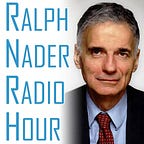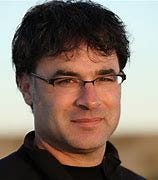In a jam-packed program full of abundant insight, Ralph first welcomes back Dahr Jamail to discuss his work “We Are the Middle of Forever: Indigenous Voices from Turtle Island on the Changing Earth” about what we can learn from indigenous people who have survived incredible disruptions to the climate to their families and to their way of life. Then Karen Friedman from the Pension Rights Center gives us an update on how they are fighting to save our hard-earned money. And finally, Cal Berkeley grad students, Sandra Oseguera and Jesus Gutierrez explain the university’s “inverted priorities” as it spends millions of dollars on football coaches’ salaries and real estate while shutting down campus libraries.
Dahr Jamail is the author of Beyond the Green Zone: Dispatches from an Unembedded Journalist in Occupied Iraq, as well as The End of Ice: Bearing Witness and Finding Meaning in the Path of Climate Disruption. He is co-editor (with Stan Rushworth) of We Are the Middle of Forever: Indigenous Voices from Turtle Island on the Changing Earth.
One of the themes of the book is the difference between the Western settler-colonialist mindset of: What are my rights? I have my rights. Versus a more Indigenous perspective that we came across time and again in the book of: We have two primary obligations that we are born into. One is the obligation to serve and be a good steward of the planet. The other obligation is to serve future generations of all species. So, if I focus on my obligations, it’s very very clear that I have plenty of work to do in service to those. If I focus only on my rights, I’m going to be chronically frustrated.
Dahr Jamail, editor of We Are the Middle of Forever: Indigenous Voices from Turtle Island on the Changing Earth
Karen Friedman is the Executive Director of the Pension Rights Center. She develops solutions and implements strategies to protect and promote the rights of consumers, and for more than 20 years has represented their interests in the media and before congressional committees.
Social Security is the strongest system we have. While opponents of Social Security have tried to undermine confidence in its future, the truth is that Social Security is one of the most universal, efficient, secure, and fair sources of retirement income…It’s not going broke, folks. It's a great system. That’s all propaganda, meant to scare the bejesus out of you.
Karen Friedman
Sandra Oseguera and Jesús Gutierrez are graduate students in the Anthropology department at The University of California, Berkeley. Last month, campus administration announced their plan to close the Anthropology Library, one of only three dedicated Anthropology libraries in the US. In response, stakeholders including students and faculty have organized to demand that the Anthropology Library be protected and fully supported by the University.
[Fighting to save the library] has been a wonderful experience of community and collaboration among many stakeholders. However, we the grad students see ourselves as the keepers and also the main users of [the Anthropology Library’s] collection because all of our research really relies on the resources that are there.
Sandra Oseguera
The library is a really valuable space. It’s not only a space for simply going in and accessing a book. It’s also a space of encounter. The kind of thing that the University is trying to destroy is essentially this possibility for having a happenstance run-in with a book that you may not necessarily have intended to type into the catalog system or with a person who you may not otherwise run into.
Jesús Gutierrez
The situation at Berkeley has become grotesquely inverted, in terms of the University. They have millions for football and other sports and paying coaches huge salaries. They have millions for administrative officials. But they want to shut down one of the great Anthropology libraries in the Western World.
Ralph Nader
In Case You Haven’t Heard
1. The Philadelphia Inquirer reports that six former Phillies players have died of the same brain cancer. All six played between 1971 and 2003. The paper obtained samples of the astroturf used between 1977 and 1981, and found 16 different types of PFAS, otherwise known as “forever chemicals.” Researchers only discovered that PFAs were present in artificial turf in 2019, so it is unknown whether these chemicals are linked to this cancer cluster.
2. Reps. Barbara Lee and Mark Pocan, both outspoken progressives, have introduced the “People Over Pentagon Act” which would cut $100 billion dollars from the defense budget. The Biden administration requested $813.3 billion in Pentagon funding in 2022. This bill would redirect these funds to healthcare, education, combating the climate crisis, and more. Public Citizen is fighting hard to advance this legislation.
3. The Hill reports a bipartisan group of Senators have introduced a bill to lift the embargo on Cuba. This “gang” is primarily made up of Senators representing states with large agricultural sectors, including Senators Amy Klobuchar of Minnesota, Jerry Moran of Kansas, among others. Senator Moran is quoted saying “the unilateral trade embargo on Cuba blocks our own farmers, ranchers and manufacturers from selling into a market only 90 miles from our shoreline, while foreign competitors benefit at our expense.”
4. Breaking news from the Intercept: Today, Republican Congressman Matt Gaetz is bringing to the floor a War Powers resolution requiring US troops to withdraw from Syria within 180 days. The Congressional Progressive Caucus is urging a “yes” vote on the resolution. This comes on the heels of Senate Majority Leader Chuck Schumer announcing that the Senate Foreign Relations Committee has reached an agreement to move forward with the repeal of the Iraq War Authorization of the Use of Military Force, or AUMF. It remains to be seen whether the Republican-controlled House will reach a similar agreement.
5. The National Highway Traffic Safety Administration, or NHTSA, has opened an investigation into Tesla’s Model Y SUV after receiving complaints of steering wheels flying off while the vehicles were being driven. This probe will cover an estimated 120,000 vehicles from the 2023 model year, via AP.
6. From the Intercept: A new, proposed FDA rule would mandate that foods labeled “healthy” contain a major food group – dairy, fruits, or whole grains – and must be under certain limits on saturated fat, sodium, and added sugars. In response, General Mills, Kellogg’s, and Post Consumer Brands – which
collectively produce almost all cereal on the market – are bitterly lobbying against this rule.
7. In Israel, a video shows former Knesset speaker Avrum Burg – who has endorsed full equality for Palestinians – being roughed up by IDF soldiers for protesting against what he calls the “pogrom” in Huwarra. Huwarra has become a flash-point in Israeli politics. The New Arab reports Israeli Finance
Minister Bezalel Smotrich called for the village to be “wiped out” before retracting that statement under immense pressure.
8. From the Washington Post: Child labor violations are up 69% since 2018. This surge is driven in part by an increase in children working hazardous jobs like meatpacking.














